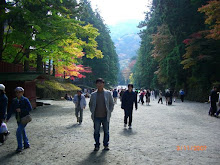Throughout Asia, Buddhism is growing fast, playing an increasingly political—and, in some spots, militant—role.
In recent years, massive groups of fervent believers have taken to the streets of Asia with angry political demands. They've railed against government corruption, condemned the onslaught of Western values and decried the erosion of traditional morals. Having built an extensive network of grass-roots aid groups, their numbers are exploding. Some have even picked up arms to defend their beliefs. Sound familiar? It should—only the faithful in question aren't Islamic fundamentalists or conservative Christians. They're Buddhists: members of what used to be Asia's quietest religion, one usually associated with pacifism and contemplation.
Some buddhist organizations are now wading straight into the rough-and-tumble of everyday politics, suggesting last year's monk-led protests in Burma weren't an anomaly. In Thailand, an ultraconservative Buddhist faction helped topple Prime Minister Thaksin Shinawatra in 2006. In India, the populist leader of a rapidly expanding Buddhist-supported party is now being touted as a future prime minister. And in the most dramatic cases, some Buddhists have even begun advocating violence—such as Sri Lanka's fiercely nationalist Jathika Hela Urumaya party—or have started picking up guns themselves, as in southern Thailand.
Buddhists are adopting a tough-minded new profile, which can be explained in part by their numbers. The religion is growing fast. Though it's hard to nail down exact figures, scholars say there are now some 100 million Buddhists in China alone. In India, the birthplace of Buddha, there were only 8 million in 2001, but experts now set the total at 35 million. And in Taiwan, the number of Buddhists grew from 5.5 million in 2001 to 8 million in 2006.
The boom reflects several factors. In China and Taiwan, the growth of the faithful reflects the loosening of political control. In recent years, Beijing has significantly eased restrictions on all the country's faiths, not least because religious values (once attacked during the Cultural Revolution) are now viewed as a vital bulwark of the "harmonious society" touted by the government. Meanwhile, as Asian societies grow richer, Buddhism's powerful critique of materialism is resonating among the new middle classes. Akash Suri, for instance, is a 25-year-old banker in New Delhi who once lived a lavish lifestyle, splurging on clothes, restaurants and expensive holidays. But a couple of years ago he began thinking "that all this fancy lifestyle was not making me happy. Instead there was anxiety and stress." Buddhism and meditation calmed him.
Click on the link title for more.

1 comment:
As a Buddhist, I don encourage aggression and violence, but I think Buddhists should be more active, esp in protecting and upholding their values as Muslims and Christians have done.
kpb
Post a Comment